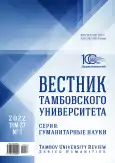Improving linguistic training in the military education system
- Authors: Shevchenko M.A.1, Mitchell L.A.1, Gorobtsov E.V.1
-
Affiliations:
- National Research Tomsk State University
- Issue: Vol 27, No 1 (2022)
- Pages: 86-96
- Section: ТЕОРИЯ И МЕТОДИКА ОБУЧЕНИЯ ИНОСТРАННОМУ ЯЗЫКУ В ВЫСШЕЙ ШКОЛЕ
- URL: https://bakhtiniada.ru/1810-0201/article/view/298188
- DOI: https://doi.org/10.20310/1810-0201-2022-27-1-86-96
- ID: 298188
Cite item
Full Text
Abstract
The ever-increasing need of the Armed Forces of the Russian Federation for specialists fluent in foreign languages is due to the expansion of military cooperation between the Russian Federation and its partner countries. In the actual conditions of interaction between the armed forces in the framework of peacekeeping operations, the timely and correct decision by the commanders to use the forces and means plays a primary role. Often, commanders have to deal with information in a foreign language. Currently, the Ministry of Defence of the Russian Federation trains military specialists in the main foreign languages – English, Chinese, French and German. The language skills of military personnel should be sufficient to enable them to perform at least basic professional communication tasks without the assistance of military language specialists. However, as has already been observed by many specialists, the development of foreign language professional communication skills often involves a certain set of difficulties. This state of affairs justifies the need to develop new and improve upon the existing programmes for training, retraining and improving the language skills of the military personnel of the Armed Forces of the Russian Federation. The aims, objectives and principles of improving the language training for the Russian military personnel, i. e. in the framework of military training centers are considered; the directions for the improvement of the military language training are formulated; the need to improve the linguistic training of the Armed Forces of the Russian Federation personnel is justified.
About the authors
M. A. Shevchenko
National Research Tomsk State University
Email: sheff-comms@mail.ru
ORCID iD: 0000-0002-8065-5685
Candidate of Pedagogy, Head of Educational Unit – Deputy Head of Military Teaching Center at National Research Tomsk State University
36 Lenin Ave., Tomsk 634050, Russian FederationL. A. Mitchell
National Research Tomsk State University
Email: lucy2306@mail.ru
ORCID iD: 0000-0003-2772-2241
Candidate of Pedagogy, Associate Professor, Associate Professor of English Language of Natural Sciences and Physics and Mathematics Faculties Department
36 Lenin Ave., Tomsk 634050, Russian FederationE. V. Gorobtsov
National Research Tomsk State University
Author for correspondence.
Email: efugen@yandex.ru
ORCID iD: 0000-0003-0565-2916
Assistant of Translation and Language Communications Department
36 Lenin Ave., Tomsk 634050, Russian FederationReferences
- Mandranov A.M., Lushnikov Y.Y. Obespechivaya mezhdunarodnuyu deyatel’nost’: Spetsifika formirovaniya obshchekul’turnykh kompetentsiy budushchikh voyennykh perevodchikov uchebnykh voyennykh tsentrov [Providing international activities. Peculiarities of forming general cultural competencies of future military interpreters of military training centers]. Vestnik voyennogo obrazovaniya [Bulletin of the Military Education], 2018, no. 5 (14), pp. 94-97. (In Russian).
- Yurchuk I. Praktika yazykovoy podgotovki v voyenno-uchebnykh zavedeniyakh inostrannykh gosudarstv [The practice of language training in military educational institutions of foreign states]. Zarubezhnoye voyennoye obozreniye [Foreign Military Review], 2009, no. 3, pp. 128-132. (In Russian).
- Shevchenko M.A., Zagaynov C.C., Mitchell P.J. Obucheniye inoyazychnomu voyennomu diskursu [Teaching foreign language military discourse]. Yazyk i kul’tura – Language and Culture, 2020, no. 51, pp. 265-287. https://doi.org/10.17223/19996195/51/14. (In Russian).
- Streletskiy A. Sistema podgotovki ofitserskikh kadrov v SShA [The system of training officers in the US]. Zaru-bezhnoye voyennoye obozreniye [Foreign Military Review], 2006, no. 11, pp. 16-21. (In Russian).
- Streletskiy A. Voyennyy institut inostrannykh yazykov VS SShA [US Military Institute of Foreign Languages]. Zarubezhnoye voyennoye obozreniye [Foreign Military Review], 2007, no. 1, pp. 24-25. (In Russian).
- Mitchell P.J., Shevchenko M.A. Teaching Military Linguists: the Experience of the United States Army. Vestnik Moskovskogo universiteta. Seriya 19. Lingvistika i mezhkul’turnaya kommunikatsiya – Moscow State University Bulletin. Series 19. Linguistics and Intercultural Communication, 2015, no. 1, pp. 89-94.
- Mitchell P.J., Shevchenko M.A. Teaching Military Linguists: the Experience of the British Army. Vestnik Moskovskogo universiteta. Seriya 19. Lingvistika i mezhkul’turnaya kommunikatsiya – Moscow State Uni-versity Bulletin. Series 19. Linguistics and Intercultural Communication, 2014, no. 3, pp. 141-148.
- Tolmachev S.G. Optimizatsiya sistemy podgotovki voyennosluzhashchikh so znaniyem inostrannogo yazyka v vooruzhennykh silakh Rossiyskoy Federatsii [Optimization of military linguists training system in the armed forces of the Russian Federation]. Vestnik Moskovskogo universiteta. Seriya 22: Teoriya perevoda – Moscow University Translation Studies Bulletin, 2014, no. 2, pp. 155-158. (In Russian).
Supplementary files








